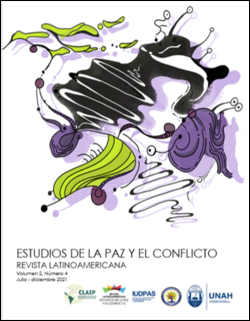EspañolPostulates for european consideration of the refugee crisis at Mediterranean Sea
DOI:
https://doi.org/10.5377/rlpc.v2i4.10874Keywords:
Migration, refugees, migrants, migration flows, human right not to emigrate, European UnionAbstract
The increase in migratory flows through the corridor between North Africa and Europe triggered the so-called 'Mediterranean refugee crisis'. Precarious boats carrying migrants in transit and with them, the news that thousands were dying at sea, fleeing war and famine, in their attempt to reach 'Fortress Europe'.
The European Union's response has been fluctuating between control and rights as part of its approach to migration management, translated into legal and discursive frameworks where both views appear: on the one hand, it declares war on people smugglers, and on the other, it imposes security and control practices and regimes that use fear as a pretext to stigmatize migrants, once again, it forgets that these migrations - a consequence of the great existing inequalities, largely caused by its own policies - are a European problem.
In this paper we will argue that the migration crisis is a European problem for: a) historical reasons: European countries were a source of massive emigration to America, Africa, Asia and Oceania as they conquered and colonized; b) political-social reasons: migration, as a 'disposable labor' force, is intertwined with colonial and imperial histories between regions where racial, gender and class categories were established and are still in place; and c) legal: starting with the three pillars of the European Union in the post-Maastricht era, through the intermediate phase of the post-Amsterdam era and also through the use of international agreements, such as the Schengen Convention of 1985 and the Dublin Treaty of 1990.
Downloads
595
HTLM (Español (España)) 169
XLM (Español (España)) 156
EPUB (Español (España)) 122
Downloads
Published
How to Cite
Issue
Section
License
The journal's contents are published under a Creative Commons Attribution 4.0 license (CC BY 4.0). This license allows third parties to share (copy and redistribute the material in any medium or format) and adapt (remix, transform and create from the material for any purpose, including commercial), as long as the authorship and first publication in this journal (Revista Latinoamericana Estudios de la Paz y el Conflicto, Universidad Nacional Autónoma de Honduras - Consejo Latinoamericano de Investigación para la Paz, DOI of the work) is acknowledged, a link to the license is provided and it is indicated if changes have been made to the original. The terms of the license are available online at http://creativecommons.org.




